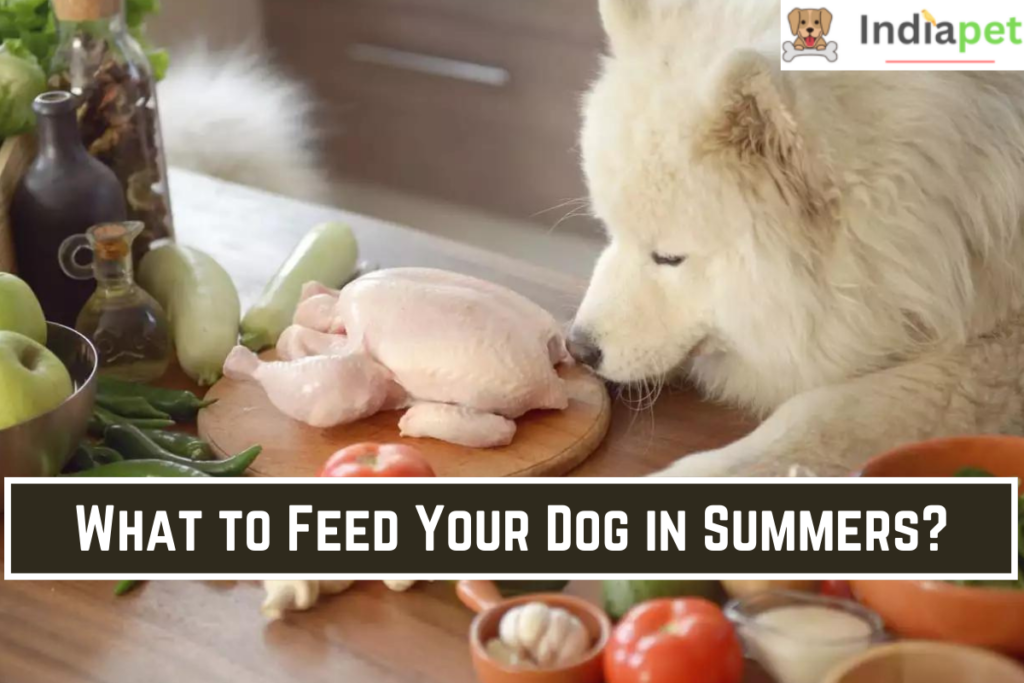What to Feed Your Dog in Summers? – As the temperature rises, it’s crucial to adjust your dog’s diet to ensure they stay healthy and comfortable. Summer heat can be taxing on dogs, and their nutritional needs may change. This guide will help you choose the best foods for your dog during the summer months, keeping them hydrated, cool, and nourished.
Understanding Your Dog’s Summer Nutritional Needs
Dogs, like humans, can suffer from the effects of heat. High temperatures can lead to dehydration, heatstroke, and general discomfort. Feeding your dog the right foods can help mitigate these risks and keep them feeling their best.

Hydration is Key
Hydration is crucial during the summer. Dogs can become dehydrated quickly, which can lead to serious health issues. Always ensure your dog has access to fresh, clean water. In addition to water, certain foods can help keep your dog hydrated.

Best Foods for Dogs in Summer
- Fresh Fruits and Vegetables: Incorporating fresh fruits and vegetables into your dog’s diet can provide essential vitamins and minerals while also helping to keep them hydrated. Some excellent options include:
- Watermelon: High in water content and low in calories, making it a perfect summer treat.
- Cucumbers: Hydrating and low in calories, cucumbers can be a refreshing snack.
- Blueberries: Packed with antioxidants and vitamins, they are a great addition to your dog’s diet.
- Lean Proteins: During summer, opt for lean proteins that are easier to digest and less taxing on your dog’s system. Some good choices include:

-
- Chicken: A lean source of protein that can be served cooked and unseasoned.
- Turkey: Another excellent lean protein that is easily digestible.
- Fish: Rich in omega-3 fatty acids, which can help with inflammation and skin health.
- Hydrating Broths: Adding low-sodium chicken or beef broth to your dog’s water or food can encourage hydration and add extra nutrients.
- Frozen Treats: Homemade frozen treats can be a delightful way to keep your dog cool. Some ideas include:

-
- Frozen Yogurt: Plain, unsweetened yogurt frozen into cubes can be a nutritious treat.
- Frozen Fruit Pops: Blend fruits like watermelon or blueberries with water and freeze them in molds for a refreshing snack.
Foods to Avoid
Certain foods can exacerbate the effects of heat or be harmful to your dog, including:
- Chocolate: Toxic to dogs and can cause serious health issues.
- High-Sodium Foods: Can lead to dehydration and other health problems.
- Fatty Foods: Harder to digest and can cause gastrointestinal upset.
people also read : What Vegetables are Good For Dogs?
Tips for Feeding Your Dog in Summer
- Feed Smaller, More Frequent Meals: Smaller meals are easier to digest and can help keep your dog’s energy levels stable throughout the day.
- Maintain a Cool Environment: Ensure your dog’s eating area is cool and shaded to encourage them to eat and stay hydrated.
- Monitor for Signs of Overheating: Watch for signs of heatstroke or dehydration, such as excessive panting, drooling, or lethargy, and take immediate action if necessary.
What to Feed Your Dog in Summers?
Conclusion
Feeding your dog the right foods during summer can make a significant difference in their health and comfort. By incorporating hydrating fruits and vegetables, lean proteins, and refreshing treats into their diet, you can help your furry friend beat the heat and stay healthy. Remember, always ensure your dog has access to plenty of fresh water and consult with your veterinarian before making any major changes to their diet.
FAQ’s
- What are the best foods to feed my dog in the summer?
The best foods to feed your dog in the summer include hydrating fruits like watermelon and cucumbers, lean proteins such as chicken and fish, and refreshing treats like frozen yogurt. These foods help keep your dog cool, hydrated, and nourished.
- How can I keep my dog hydrated during the summer?
To keep your dog hydrated during the summer, provide plenty of fresh, clean water at all times. Incorporate water-rich foods like watermelon and cucumbers into their diet, and consider adding low-sodium broths to their meals. Frozen treats made from pureed fruits or yogurt can also help.
- What fruits and vegetables are safe for dogs to eat in the summer?
Safe fruits and vegetables for dogs in the summer include watermelon, blueberries, cucumbers, cantaloupe, and apples (without seeds). These options are hydrating, low in calories, and packed with essential nutrients, making them ideal for summer.
- Can my dog eat watermelon?
Yes, dogs can eat watermelon. It’s a hydrating and nutritious snack that’s perfect for summer. Just make sure to remove the seeds and rind, as they can cause digestive issues. Serve it in small, manageable pieces to avoid choking hazards.
- What signs indicate my dog is overheating or dehydrated?
Signs that your dog may be overheating or dehydrated include excessive panting, drooling, lethargy, red or pale gums, and vomiting. If you notice these symptoms, move your dog to a cooler area, provide fresh water, and seek veterinary care if the symptoms persist.

